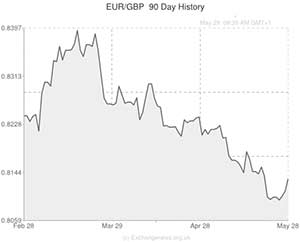
On Friday the Euro softened slightly against the Pound but maintained a fairly steady position ahead of next week’s influential policy decisions.
The Euro came under pressure as inflation figures from Italy and Spain (two prominent Eurozone members) showed a slowing in consumer price increases and added to the case for the European Central Bank introducing stimulus next week.
Germany’s lacklustre retail sales report also had an impact.
While economists had envisaged Germany’s retail sales increasing by 0.2 per cent in April, month-on-month, they actually dropped by 0.9 per cent.
The monthly decline was the first for four months and fits with an emerging pattern of slightly disappointing German data releases.
The Euro to Pound exchange rate is currently trading around 0.8129.
Industry expert Christian Schulz said that if retail sales ‘remained unchanged for the rest of the quarter, second quarter retail sales would end up being 0.6 per cent below the first quarter average [But] Germany will remain a growth engine in the Eurozone, helping former crisis countries export their way out of trouble due to its strong domestic demand.’
The Pound meanwhile received some support from the UK’s GfK consumer confidence survey.
The measure achieved a nine-year high of 0 in May and smashed economists’ expectations for a more modest improvement from -3 to -2.
Although the surge in sentiment didn’t extend to individuals’ assessment of their own circumstances, the report was a welcome change from the monotony of a fairly data-less week for the UK.
Separate UK figures showed an increase in domestic house prices in May. House prices were up 0.5 per cent on the month and 6.1 per cent on the year.
The British Chambers of Commerce also opted to positively revise its growth forecasts for the UK.
The BCC now envisages growth of 3.1 per cent in 2014, up from a previous forecast of 2.8 per cent and the fastest rate of growth expected since 2007.
Katja Hall, deputy director general of the Confederation of British Industry, recently observed; ‘The UK economy is performing strongly and this is thanks to rising business and consumer confidence, better credit conditions at home and improving global economic conditions. But there are risks to the UK’s outlook from global developments, including the possibility that the situation in Ukraine and Russia could impact on global commodity prices.’
However, even with all these positive developments, Sterling’s movement was restrained as investors focused on next week’s Bank of England and European Central Bank rate decisions.
The BoE is expected to leave policy unaltered, but if the ECB brings in additional stimulus (as expected by the majority of economists) the Pound could post significant gains against the Euro during the second half of next week.
Euro Exchange Rates
[table width=”100%” colwidth=”50|50|50|50|50″ colalign=”left|left|left|left|left”]
Currency, ,Currency,Rate ,
Euro, ,Pound Sterling,0.8129,
,Pound Sterling,0.8129,
Euro, ,US Dollar,1.3610,
,US Dollar,1.3610,
Euro, ,Canadian Dollar,1.4779,
,Canadian Dollar,1.4779,
Euro, ,Australian Dollar,1.4646,
,Australian Dollar,1.4646,
Euro, ,New Zealand Dollar,1.6060,
,New Zealand Dollar,1.6060,
US Dollar, ,Euro ,0.7350,
,Euro ,0.7350,
Pound Sterling, ,Euro,1.2294,
,Euro,1.2294,
Canadian Dollar, ,Euro,0.6788,
,Euro,0.6788,
Australian Dollar, ,Euro,0.6833,
,Euro,0.6833,
New Zealand Dollar, ,Euro,0.6253,
,Euro,0.6253,
[/table]

Comments are closed.